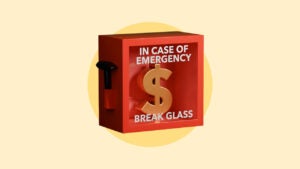Borrow money safely in crisis: Bankrate’s 2023 analysis

The U.S. economy has been through a rough patch over the past few months, and as inflation continues to soar economic conditions worsen. Economists now predict that there’s a 59 percent recession risk by July 2024. Interest rates and unemployment are also expected to rise, further straining the finances of millions of Americans who are already feeling the pinch.
Bankrate’s 2023 annual emergency savings report revealed that if faced with an unexpected loss of income, more than two in three Americans (68 percent) would be worried about their ability to cover a month’s worth of living expenses. Added to that, Americans’ optimism regarding their financial situation has waned. Seventy-two percent of U.S. adults feel like they’re not completely financially secure, with 26 percent expecting they never will be.
Saving in tough economic times can be challenging, but it’s better than borrowing money disproportionately, as having a small nest egg could protect you in case of the unexpected.
Inflation and default statistics
- According to economists, there’s a 59% recession risk between now and July 2024.
- The Fed rate has also risen above 5%, making borrowing across various credit products more expensive.
- Personal loans currently have an average interest rate of 12.42%, which is higher than pre-pandemic levels.
- Rising inflation and a rising rate environment will increase serious delinquencies to levels not seen since 2010, particularly among credit card and personal loan products.
- Inflation, rising interest rates and employment changes have affected Americans’ ability to save, with 74% saying they’re saving less now due to one of these factors than a year ago.
- 85% of Gen Zers and 79% of millennials would be worried about their ability to cover a month’s worth of expenses if they were to lose their primary source of income.
- 1 in 4 Americans say they would rather use their credit card instead of tapping into their savings to cover a large emergency expense as they can pay it off over time.
- If hit with an unexpected $1,000 expense, only 43% of Americans would be able to cover it using their savings.
- 26% of Americans say high or revolving debt is keeping them from feeling financially secure.
Best ways to borrow money
Most financial experts advise against borrowing when you’re in a tight financial spot, as this could lead to a vicious debt cycle. That said, if borrowing is your only viable option, make sure to weigh all the options available — paying special attention to interest rates, terms and fees, as there are better ways to borrow than others.
Safer lending options
When it comes to borrowing money in a time of crisis, these are some of the safest bets.
Friend or family member
If you only need to borrow a couple hundred dollars, asking one of your closest friends or a family member to lend you the money can be a great option. Although you may feel self-conscious or even embarrassed about asking for such a favor, borrowing money from someone you know will give you the flexibility to pay them back at your pace, without having to worry about dents in your credit report.
0% APR credit card
Some credit card companies offer consumers a 0 percent introductory offer in which any purchase they make over a specific period of time (usually between six to 15 months) is interest-free. However, any remaining amount that isn’t paid after the introductory period ends will accrue interest. Additionally, you’ll need excellent credit to qualify for these offers.
Personal loan from bank or credit union
Personal loans have one of the lowest interest rates available among credit products. Currently, the average personal loan interest rate is 10.99 percent compared to 20.44 percent, which is the average interest rate for credit cards. One of the benefits of using a personal loan to finance an emergency is that they have fixed interest rates and terms, so your payments will remain the same over the life of the loan. Besides that, many companies give borrowers between two and seven years to pay off their loans, making monthly payments more manageable.
On the downside, some lenders may charge origination fees or prepayment penalties, so make sure you take a look at the terms and conditions before you apply.
Friend or family member
If you only need to borrow a couple hundred dollars, asking one of your closest friends or a family member to lend you the money can be a great option. Although you may feel self-conscious or even embarrassed about asking for such a favor, borrowing money from someone you know will give you the flexibility to pay them back at your pace, without having to worry about dents in your credit report.
Buy now, pay later
Buy now, pay later or BNPL are a type of short-term installment loan that allows you to finance purchases, interest-free, for a specified period of time (usually between four and six installments). Although these loans are issued based on credit, you don’t need an excellent score to qualify. That said, if you fail to repay your entire loan after the interest-free period, you will be charged interest on any remaining amount. Additionally, these loans lack liquidity and can only be used at select stores.
Money lending apps
If you’re in need of some quick cash, a cash advance app could be the answer. These apps allow you to borrow money against your next paycheck and many of them don’t charge any additional interest or fees. However, you must be careful when using them, as they could lead to overspending.
Still, if this is an option you’d like to explore, here are some of the apps that lend money to its users:
Brigit
Designed as a budget management app, Brigit also serves as a borrowing money app, allowing members to access up to $250 instantly through its Instant Cash feature. The company doesn’t require you to pass a credit check to access this feature nor does it charge any late payment fees. However, users must pay a monthly subscription fee of $9.99 in order to access the Instant Cash feature.
Chime
To access a cash advance through Chime, you’ll need to have a checking account with the company. Once you have that, you’ll have access to the SpotMe feature, which allows you to overdraw your account by as much as $200, without any fees.
Dave
Dave is a digital banking platform. Among its services, the company offers a feature called ExtraCash, which allows users to get a cash advance of up to $500, without any interest or fees.
Payday loans and other risky lending options
There are certain types of emergency loans that should be avoided at all costs. That is because they’re highly risky products that offer unfair terms and extremely high interest rates that make it almost impossible for borrowers to repay their debts. These are two of them.
Payday loans
Payday loans allow borrowers to take out small amounts of cash (usually not more than $500) in exchange for extremely high interest rates and fees. Although some states limit interest rates to 36 percent, in others, like Texas, borrowers can expect to pay as much as 664 percent on interest. What’s more: only 14 percent of consumers who take out these loans are able to pay them back, which is why you should refrain from using them altogether.
Car title loans
When you take out a car title loan, you’re using your vehicle as collateral. These loans are usually short-term (no more than 30 days) and you can borrow up to 50 percent of your vehicle’s value. Car title loans come with exorbitant fees and interest rates as high as 300 percent and, if you don’t pay back your loan, you could lose your vehicle.
How to budget during uncertain times
Budgeting can be more challenging than usual during times of economic uncertainty as there are many moving parts that are out of our control.
Ralph Bender, CEO and founder of Enduring Wealth Advisors says that, when things are tight, the most effective way of budgeting is to prioritize what’s necessary (food, healthcare, shelter, etc.) and cut back on everything else.
“Unfortunately, many of the reasons we get into trouble is that we get locked into contracts for ‘desired’ things,” Bender adds.
“If you see tough financial times ahead and you have a loan or financial obligation, be proactive and reach out to that institution. They will be more receptive to customers that reach out to explain their situation and look for ways to service the debt obligation.”
— Mac GardnerFounder and CEO at FinLit Tech
He also adds that it’s important during hard times to keep cash flow going, as many banks won’t lend money to those without liquidity — even in case of an emergency.
“In today’s gig economy you can generate cash flow through ride sharing platforms like Uber or Uber eats. If you’re a collector, it may be wise to value your collection and utilize tools like eBay or other platforms to create liquidity,” Gardner says.
If you aren’t sure on how to improve your cash flow, here are some ideas to help you get started:
- Use a budgeting app: Budgeting apps like Mint and PocketGuard offer free versions and can help you better manage your finances by showing you where your money is going. These apps also keep track of how much money you have left after expenses each month, which can make it easier for you to establish a savings goal.
- Track your spending habits: Keeping tabs on your spending habits can help you understand which expenses you can cut back on, improving your liquidity each month.
- Take advantage of discounts: Whenever you shop for something, see if you can get it at a discounted price, instead of paying full price. You can do this virtually with any product, from groceries to clothes. Also, swap brand items for generic ones whenever possible.
- Go on a spending freeze: A spending freeze is basically a challenge you make for yourself and consists of not spending any money — or the bare minimum — for the time period established by yourself. Spending freezes can be useful to develop self-control when it comes to spending money and also to see what expenses you can live without.
The bottom line
The U.S. economy is currently experiencing a rough spot and everyone’s feeling the pinch. Although borrowing money may seem like a good choice if you’re tight financially, there are other alternatives that you can explore to improve your cash flow. Make sure you explore all the options available before making your final decision, as this could spare you future financial headaches. If you’re having trouble repaying debts, compare debt consolidation loans.
-
The three surveys referenced above were commissioned by Bankrate.com. Here’s how we got the results:
- Bankrate’s 2023 annual emergency savings report. This study was conducted for Bankrate by SSRS on its Opinion Panel Omnibus platform. The SSRS Opinion Panel Omnibus is a national, twice-per-month, probability-based survey. Interviews were conducted from December 16-19, 2022 among a sample of 1,028 respondents in English (1,003) and Spanish (25). The survey was conducted via web (998) and telephone (30). The margin of error for total respondents is +/-3.5 percentage points at the 95% confidence level. All SSRS Omnibus data are weighted to represent the target population.
- Survey: Majority of Americans delaying financial milestones, opting out of activities or events because of the state of the economy. Bankrate.com commissioned YouGov Plc to conduct the survey. All figures, unless otherwise stated, are from YouGov Plc. The total sample size was 2,442 adults. Fieldwork was undertaken between October 19-21, 2022. The survey was carried out online and meets rigorous quality standards. It employed a nonprobability-based sample using quotas upfront during collection and then a weighting scheme on the back end designed and proven to provide nationally representative results.
- Survey: The average American feels they’d need over 200k a year to be financially comfortable. Bankrate commissioned YouGov Plc to conduct the survey. All figures, unless otherwise stated, are from YouGov Plc. Total sample size was 2,521 U.S. adults. Fieldwork was undertaken June 5-7, 2023. The survey was carried out online and meets rigorous quality standards. It employed a non-probability-based sample using both quotas upfront during collection and then a weighting scheme on the back end designed and proven to provide nationally representative results.
Why we ask for feedback Your feedback helps us improve our content and services. It takes less than a minute to complete.
Your responses are anonymous and will only be used for improving our website.
You may also like

How to get an emergency loan in 5 simple steps





